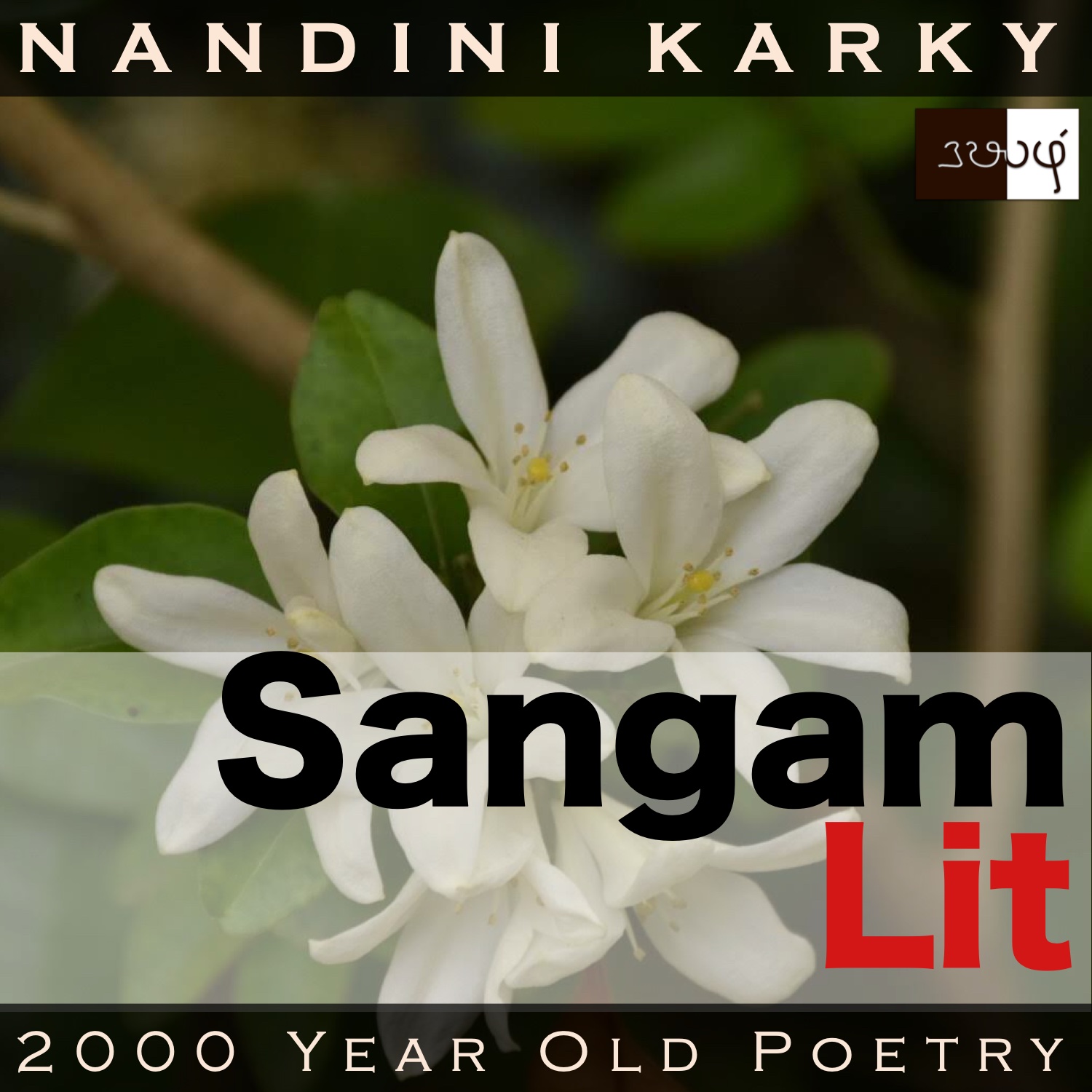Podcast: Play in new window | Download
Subscribe: Apple Podcasts | Spotify | Amazon Music | Android | iHeartRadio | TuneIn | RSS | More

In this episode, we observe the projection of inner angst on the outer world, as portrayed in Sangam Literary work, Kurunthogai 126, penned by Okkoor Maasaathiyaar. Set in the forest regions of ‘Mullai’, the verse speaks in the voice of the lady to her confidante, conveying her pain as the man remains parted away.
”இளமை பாரார் வளம் நசைஇச் சென்றோர்
இவணும் வாரார்; எவணரோ?” என,
பெயல் புறந்தந்த பூங் கொடி முல்லைத்
தொகு முகை இலங்கு எயிறு ஆக
நகுமே-தோழி!-நறுந் தண் காரே.
‘Flowers and showers’ soak us in this one. The opening words ‘இளமை பாரார் வளம் நசைஇ’ meaning ‘considering not youth but wanting wealth’ showcase the quintessential conflict in Sangam verses – the oft-repeated tug-o-war between relishing youth and seeking wealth. Next, the central object of the verse can be seen in ‘பூங் கொடி முல்லைத் தொகு முகை’ talking about ‘a row of wild jasmine flower buds’. In addition, we can glimpse at ‘shining teeth’ in ‘இலங்கு எயிறு’. Ending with the words ‘நகுமே-தோழி-நறுந் தண் காரே’ meaning ‘it laughs, my friend, this fragrant and moist season of rains’, the verse illustrates the evergreen bond between flowers and seasons and welcomes us within!
Images of shining teeth and laughter – Doesn’t sound much like a song of sorrow! But, let’s look into the context to investigate. The context reveals that the man and lady were leading a happy, married life when the man left the lady to go in search of wealth. Before he leaves, the man promises to return by a particular season. One day therafter, the lady turns to her confidante and says, “Telling me ‘he parted away, thinking not of youth and desiring only wealth; And, he still has not returned; Where could he be?’, those wild jasmine vines, raised by the rains, in a neat row of blooms, akin to shining teeth, laugh at me, my friend, in this fragrant and cool season of showers!” With these words, the lady expresses to her friend how the world around seems to be laughing at her pitiable state as the man had not returned to her before the promised season.
Sights of a drizzle from the skies and scents of jasmine from the vines – To us, it feels like a walk in paradise, but here’s a lady who sees these pleasures as pain. The lady starts her narration with the words of someone. These words seem to talk about the actions of the man, who had thought only about earning wealth and not considered the fleeting nature of youth, and had thus, left the lady. Ending with the declaration that the man was not there at home and wondering where he could be, that speaker concludes their statement. When we look into who this speaker might be, the lady resolves the riddle by pointing to the flowering vines of the wild jasmine, a plant that is protected and groomed by the rains. And now, these buds are all raising their heads in a neat row, making the lady think they might be shining teeth. Saying those words about the man we just saw, these flowers with their teeth-like buds seem to be laughing at the lady’s state of misery in that season, she concludes!
Looking at this scene objectively, it is just jasmine buds blooming because the season that nurtures them had arrived as always. But, this seasonal sight makes the lady see mocking laughter and hear words of humiliation instead. There can be no better instance of projecting how we feel inside on the world outside. The dynamic emotions within colour the world outside and that’s exactly what’s happening to the lady as her man seems to have shirked his promise to return on time. If the world within can change how we see the world outside, could the reverse be true? For instance, can the lady feel a caressing breeze envelope her and think that it’s the man sending his embrace and relaying his promise to return soon? Hope anyone in suffering like the lady in this verse can change the flow of their narrative to recover these reins of control they seem to have relinquished in their angst!




Share your thoughts...